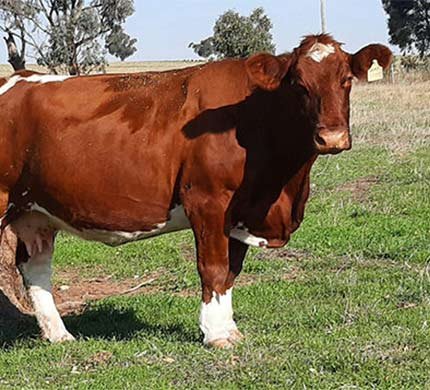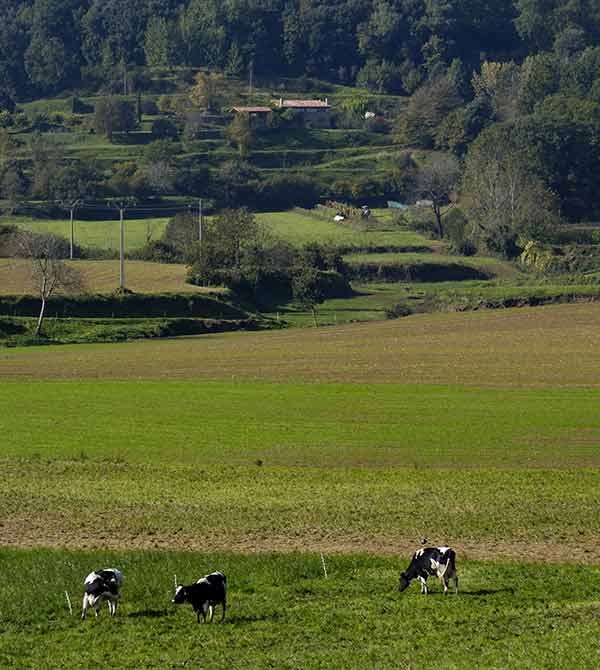Maine-Anjou
- Temperature:5 and 30 degrees Celsius
- Milk:5 and 15 liters per day
- Food:Grain, Hay, Pasture
- Pregnancy:Approximately 280-290 days
- Nationality:France

General Information
Maine-Anjou cattle, also known as Red Pied cattle, are a breed of cattle that were developed in the region of Maine and Anjou in France. They were first developed in the early 19th century from a cross between local French cattle breeds and Durham cattle imported from England.
Maine-Anjou cattle are typically medium to large in size, with mature cows weighing between 1,000 and 1,500 pounds and mature bulls weighing between 2,000 and 2,500 pounds. They are known for their distinctive red and white coloring, although some individuals may be solid red or white.
Maine-Anjou cattle are primarily raised for beef production, although they are capable of producing milk as well. They are known for their high-quality meat, which is tender and well-marbled. They are also valued for their docile temperament, making them relatively easy to handle and work with.
Where we find this cow to buy?
If you are looking to buy Maine-Anjou cattle, you may be able to find them through various sources such as:
01. Breeders : You can find breeders of Maine-Anjou cattle through breed associations, agricultural fairs and exhibitions, and online directories.02. Livestock auctions : Livestock auctions and sales can be a good place to find Maine-Anjou cattle for sale. You can check with your local livestock auction to see if they have any upcoming sales featuring Maine-Anjou cattle.03. Online marketplaces : There are various online marketplaces that list livestock for sale, including Maine-Anjou cattle. Some popular online marketplaces include Cattle-exchange.com, Livestock.com, and RanchWorldAds.com.
It’s important to do your research and select a reputable seller who raises healthy and well-cared-for animals. Be sure to ask questions about the animal’s health, breeding history, and any relevant information about their care and management.

How to increase milk production in Maine-Anjou
There are several ways to increase milk production in Maine-Anjou cattle. Here are a few strategies that may be effective:
01
Nutritionists can help formulate a diet plan to maximize milk production in Maine-Anjou cattle by providing high-quality, clean, and fresh feed.
02
Milking techniques can help stimulate milk production and prevent infections by ensuring equipment is sanitized and maintained, and cows are milked at regular intervals.
03
Access to clean water is essential for milk production, so ensure cattle have access at all times and enough water sources to prevent overcrowding.
04
Proper herd management practices can increase milk production by providing regular health checks, prompt treatment, and adequate rest and exercise.
Medicine
As with all cattle, Maine-Anjou may require different types of medicines depending on their specific health needs. Here are some common types of medicines that may be used for Maine-Anjou cattle:
01
AntibioticsAntibiotics are used to treat bacterial infections in cattle, such as respiratory infections, mastitis, and metritis.
02
DewormersDewormers are used to treat internal parasites, such as roundworms and tapeworms.
03
VaccinesVaccines work by stimulating the cow’s immune system to produce antibodies against disease-causing agents.
04
Pain relief medicationHese are NSAIDs used to relieve pain caused by injuries, surgeries, or other medical procedures.
Pregnancy
Maine-Anjou cows will typically mate with a bull during their fertile period, which occurs roughly every 21 days. A cow’s fertile period lasts for about 24 hours, during which she will stand to be mounted by a bull.
When it’s time for the cow to give birth, she will typically seek out a quiet and secluded place to do so. After a labor period that usually lasts several hours, the calf will be born.
When a bull mates with a cow, he deposits semen into her reproductive tract, which can result in fertilization of the cow’s eggs. Fertilization usually occurs in the cow’s oviducts, which are part of the female reproductive system.
The gestation period for Maine-Anjou cows is approximately 280 days, or around 9 months. During this time, the cow’s body undergoes various changes to support the growing fetus, including an increase in body weight, udder development, and changes in behavior.
Important!
Throughout the pregnancy, it’s important to monitor the cow’s health and behavior and seek veterinary care if any issues arise. Providing proper nutrition, access to clean water, and a comfortable and safe environment can also help ensure a successful pregnancy and healthy calf.
Food
Maine-Anjou cattle, like all cattle breeds, require a balanced diet that provides them with the appropriate amounts of protein, carbohydrates, fats, vitamins, and minerals. Here are some types of food that are commonly fed to Maine-Anjou cattle:
Forage, such as grass, hay, and silage, should form the basis of the Maine-Anjou’s diet. Grasses and legumes provide fiber and carbohydrates, as well as important vitamins and minerals.
Concentrates, such as grains and oilseed meals, can be used to supplement the Maine-Anjou’s diet and provide additional protein, energy, and essential nutrients.
Clean, fresh water is essential for Maine-Anjou cattle to maintain their health and well-being.
Maine-Anjou cattle require a balanced mix of minerals, such as calcium, phosphorus, and potassium.
Facts
Here are some facts about Maine-Anjou cattle:
Maine-Anjou cattle are a breed of beef cattle that originated in the Maine and Anjou regions of France.
They are adaptable to a wide range of environments and can thrive in both hot and cold climates.
Maine-Anjou cattle are recognized by their distinctive appearance, including their wide-set eyes and thick necks.
The breed has been used to improve the genetics of other cattle breeds, such as the Limousin and Charolais.
Maine-Anjou cattle are known for their docile and easy-going temperament, which makes them easier to handle than some other breeds of cattle.
They are one of the largest and heaviest breeds of cattle, with bulls weighing up to 3,500 pounds and cows weighing up to 2,000 pounds.
Maine-Anjou cattle have been exported to many countries around the world, including the United States, Canada, Australia, and South Africa.
Maine-Anjou cattle are known for their rapid growth and high muscle-to-bone ratio, which makes them desirable for beef production.